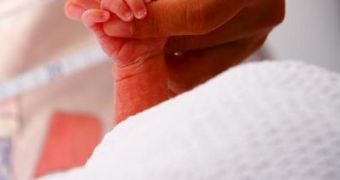Stem cells are currently under large waves of self-righteous, moral criticism for nothing, when they could be saving lives. These precursor cells have proven their ability to cure or replace a large number of organs, including hearts, lungs, livers, skin, and so on. Just recently, it was shown that stem cells derived from the bone marrow could be used to synthesize treatments that could potentially save the lungs, and life, of babies born ahead of term. A new scientific study, detailing the mouse experiments, appears in the latest issue of the American Journal of Respiratory and Critical Care Medicine.
In charge of the investigation has been Dr. Bernard Thebaud, an expert that holds joint appointments, in the Royal Alexandra Hospital Stollery Children's Hospital Neonatal Intensive Care Unit, and at the University of Alberta Faculty of Medicine and Dentistry. The scientist found a way of bringing his two favored fields of research – helping small children born weeks ahead of term live, and his passion for stem cells – together, and created something tremendously useful. In their latest work, the expert and his team managed to show that exposing the lungs of prematurely born rats to stem cells was extremely beneficial, and healed the organs, ScienceDaily reports.
According to the test results, two weeks after stem cells were administered, the rats were able to run twice as faster, and also had higher survival rates than their peers in a control group, which were not given the stem-cell treatment. “The really exciting thing that we discovered was that stem cells are like little factories, pumping out healing factors. That healing liquid seems to boost the power of the healthy lung cells and helps them to repair the lungs,” Thebaud, who is also an Alberta Heritage Foundation for Medical Research clinical scholar, explains.
“The dilemma we face with these tiny babies is a serious one. When they are born too early, they simply cannot breathe on their own. To save the babies' lives, we put them on a ventilator and give them oxygen, leaving many of them with chronic lung disease. Before the next decade is out I want to put a stop to this devastating disease,” the expert says. “In a few short years, I anticipate we will be able to take these findings and begin clinical trials with premature babies,” University of California in San Francisco (UCSF) Professor of Pediatrics Dr. Roberta Ballard concludes.

 14 DAY TRIAL //
14 DAY TRIAL //